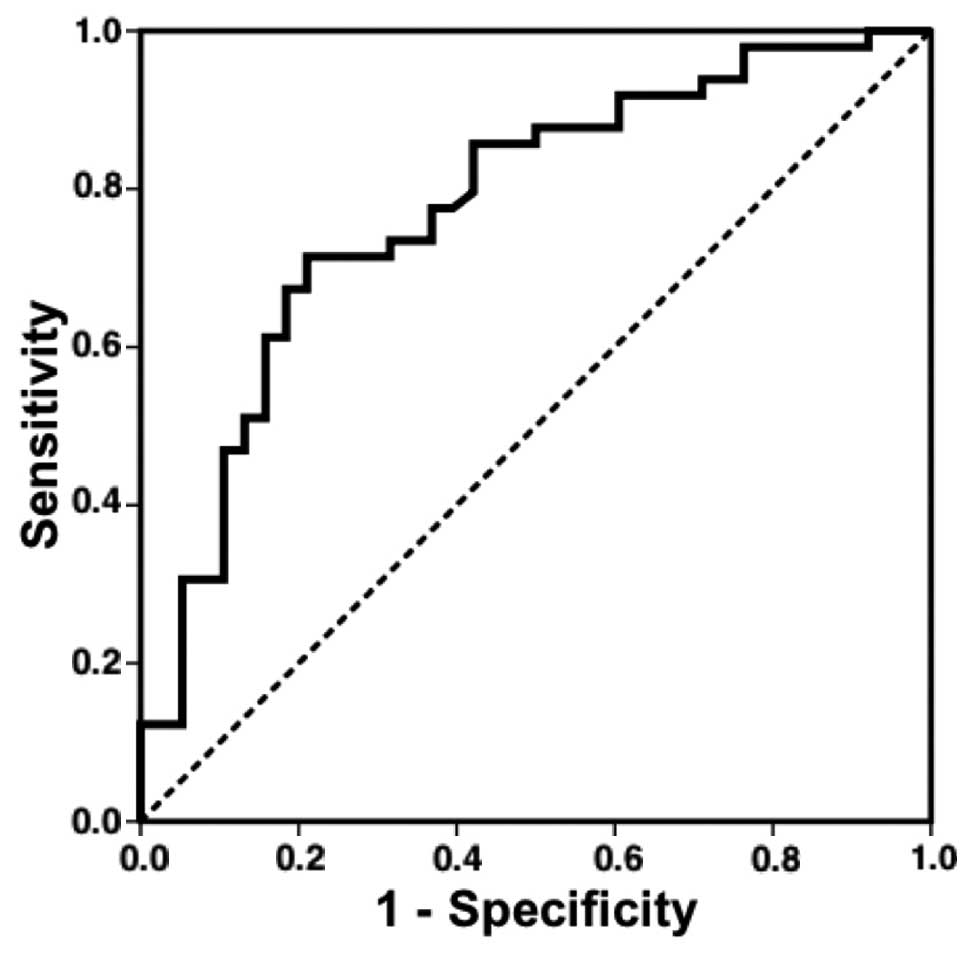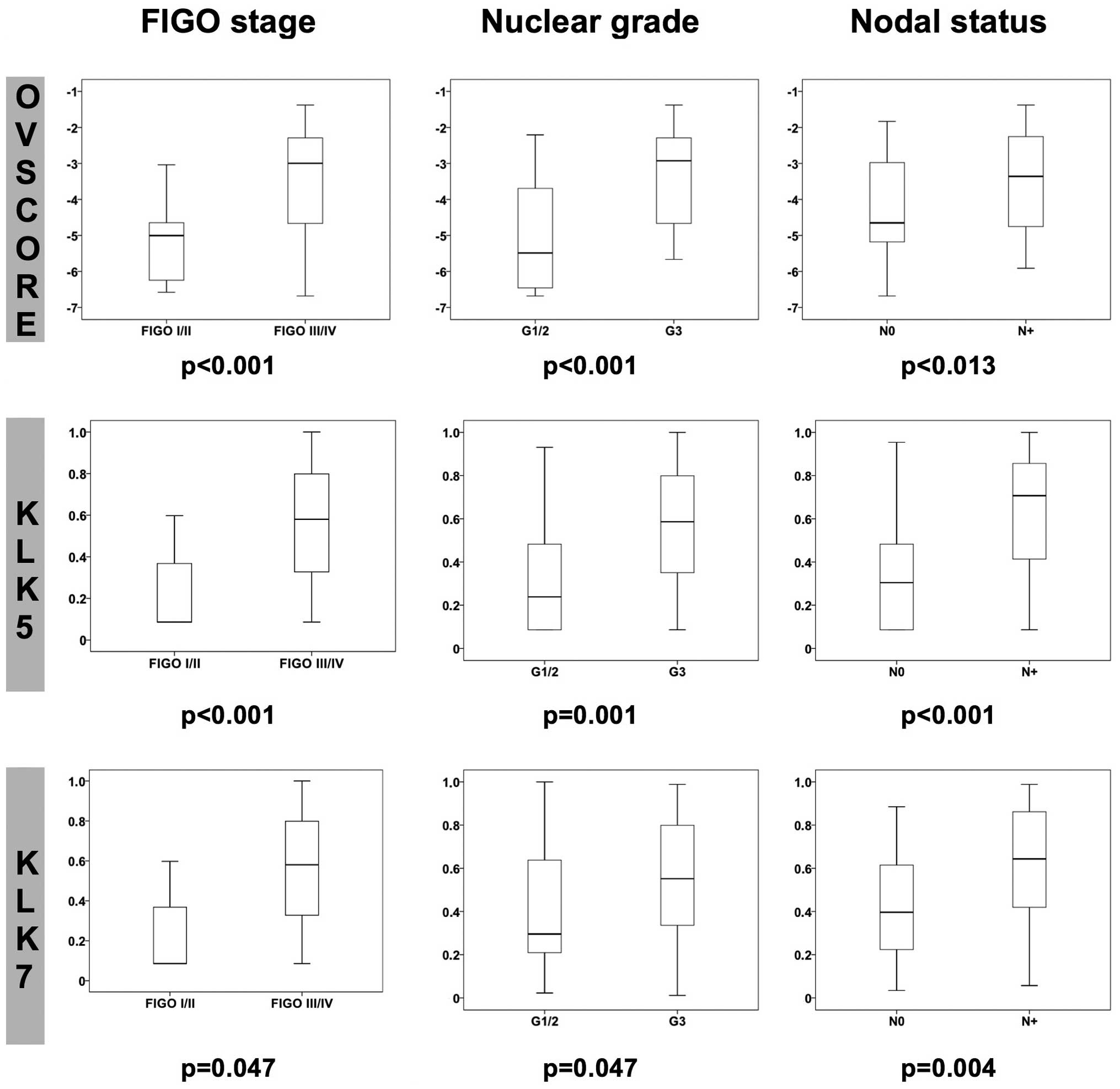|
1
|
du Bois A, Reuss A, Pujade-Lauraine E, et
al: Role of surgical outcome as prognostic factor in advanced
epithelial ovarian cancer: a combined exploratory analysis of 3
prospectively randomized phase 3 multicenter trials: by the
Arbeitsgemeinschaft Gynaekologische Onkologie Studiengruppe
Ovarialkarzinom (AGO-OVAR) and the Groupe d’Investigateurs
Nationaux Pour les Etudes des Cancers de l’Ovaire (GINECO). Cancer.
115:1234–1244. 2009. View Article : Google Scholar : PubMed/NCBI
|
|
2
|
Buys SS, Partridge E, Black A, et al; PLCO
Project Team. Effect of screening on ovarian cancer mortality: the
Prostate, Lung, Colorectal and Ovarian (PLCO) Cancer Screening
Randomized Controlled Trial. JAMA. 305:2295–2303. 2011. View Article : Google Scholar : PubMed/NCBI
|
|
3
|
Panici BP, Maggioni A, Hacker N, et al:
Systematic aortic and pelvic lymphadenectomy versus resection of
bulky nodes only in optimally debulked advanced ovarian cancer: a
randomized clinical trial. J Natl Cancer Inst. 97:560–566. 2005.
View Article : Google Scholar : PubMed/NCBI
|
|
4
|
Crawford SC, Vasey PA, Paul J, et al: Does
aggressive surgery only benefit patients with less advanced ovarian
cancer? Results from an international comparison within the
SCOTROC-1 Trial. J Clin Oncol. 23:8802–8811. 2005. View Article : Google Scholar : PubMed/NCBI
|
|
5
|
Borley J, Wilhelm-Benartzi C, Brown R and
Ghaem-Maghami S: Does tumour biology determine surgical success in
the treatment of epithelial ovarian cancer? A systematic literature
review. Br J Cancer. 107:1069–1074. 2012. View Article : Google Scholar : PubMed/NCBI
|
|
6
|
Dowdy SC, Mullany SA, Brandt KR, et al:
The utility of computed tomography scans in predicting suboptimal
cytoreductive surgery in women with advanced ovarian carcinoma.
Cancer. 101:346–352. 2004. View Article : Google Scholar : PubMed/NCBI
|
|
7
|
Axtell AE, Lee MH, Bristow RE, et al:
Multi-institutional reciprocal validation study of computed
tomography predictors of suboptimal primary cytoreduction in
patients with advanced ovarian cancer. J Clin Oncol. 25:384–389.
2007. View Article : Google Scholar : PubMed/NCBI
|
|
8
|
Dorn J, Schmitt M, Kates R, et al: Primary
tumor levels of human tissue kallikreins affect surgical success
and survival in ovarian cancer patients. Clin Cancer Res.
13:1742–1748. 2007. View Article : Google Scholar : PubMed/NCBI
|
|
9
|
Dorn J, Bayani J, Yousef GM, et al:
Clinical utility of kallikrein-related peptidases (KLK) in
urogenital malignancies. Thromb Haemost. 110:408–422. 2013.
View Article : Google Scholar : PubMed/NCBI
|
|
10
|
Dorn J, Milou V, Kulasingam V, et al:
Clinical relevance of kallikrein-related peptidases in ovarian
cancer. Kallikrein-Related Peptidases. Novel Cancer-Related
Biomarkers. Magdolen V, Sommerhoff CP, Fritz H and Schmitt M: 2.
deGruyter; Berlin: pp. 145–166. 2012
|
|
11
|
Diamandis EP, Borgono CA, Scorilas A, et
al: Immunofluorometric quantification of human kallikrein 5
expression in ovarian cancer cytosols and its association with
unfavorable patient prognosis. Tumour Biol. 24:299–309. 2003.
View Article : Google Scholar
|
|
12
|
Kim H, Scorilas A, Katsaros D, et al:
Human kallikrein gene 5 (KLK5) expression is an indicator of poor
prognosis in ovarian cancer. Br J Cancer. 84:643–650. 2001.
View Article : Google Scholar : PubMed/NCBI
|
|
13
|
Hoffman BR, Katsaros D, Scorilas A, et al:
Immunofluorometric quantitation and histochemical localisation of
kallikrein 6 protein in ovarian cancer tissue: a new independent
unfavourable prognostic biomarker. Br J Cancer. 87:763–771. 2002.
View Article : Google Scholar : PubMed/NCBI
|
|
14
|
Seiz L, Dorn J, Kotzsch M, et al: Stromal
cell-associated expression of kallikrein-related peptidase 6 (KLK6)
indicates poor prognosis of ovarian cancer patients. Biol Chem.
393:391–401. 2012. View Article : Google Scholar : PubMed/NCBI
|
|
15
|
Dorn J, Gkazepis A, Kotzsch M, et al:
Clinical value of protein expression of kallikrein-related
peptidase 7 (KLK7) in ovarian cancer. Biol Chem. 395:95–107. 2014.
View Article : Google Scholar
|
|
16
|
Scorilas A, Borgoño CA, Harbeck N, et al:
Human kallikrein 13 protein in ovarian cancer cytosols: a new
favorable prognostic marker. J Clin Oncol. 22:678–685. 2004.
View Article : Google Scholar : PubMed/NCBI
|
|
17
|
Dorn J, Harbeck N, Kates R, et al: Disease
processes may be reflected by correlations among tissue kallikrein
proteases but not with proteolytic factors uPA and PAI-1 in primary
ovarian carcinoma. Biol Chem. 387:1121–1128. 2006. View Article : Google Scholar : PubMed/NCBI
|
|
18
|
Christopoulos TK and Diamandis EP:
Enzymatically amplified time-resolved fluorescence immunoassay with
terbium chelates. Anal Chem. 64:342–346. 1992. View Article : Google Scholar : PubMed/NCBI
|
|
19
|
Shan SJ, Scorilas A, Katsaros D, et al:
Unfavorable prognostic value of human kallikrein 7 quantified by
ELISA in ovarian cancer cytosols. Clin Chem. 52:1879–1886. 2006.
View Article : Google Scholar : PubMed/NCBI
|
|
20
|
Kyriakopoulou LG, Yousef GM, Scorilas A,
et al: Prognostic value of quantitatively assessed KLK7 expression
in ovarian cancer. Clin Biochem. 36:135–143. 2003. View Article : Google Scholar : PubMed/NCBI
|
|
21
|
Dorn J, Magdolen V, Gkazepis A, et al:
Circulating biomarker tissue kallikrein-related peptidase KLK5
impacts ovarian cancer patients’ survival. Ann Oncol. 22:1783–1790.
2011. View Article : Google Scholar : PubMed/NCBI
|
|
22
|
Psyrri A, Kountourakis P, Scorilas A, et
al: Human tissue kallikrein 7, a novel biomarker for advanced
ovarian carcinoma using a novel in situ quantitative method of
protein expression. Ann Oncol. 19:1271–1277. 2008. View Article : Google Scholar : PubMed/NCBI
|
|
23
|
Dong Y, Tan OL, Loessner D, et al:
Kallikrein-related peptidase 7 promotes multicellular aggregation
via the alpha(5)beta(1) integrin pathway and paclitaxel
chemoresistance in serous epithelial ovarian carcinoma. Cancer Res.
70:2624–2633. 2010. View Article : Google Scholar : PubMed/NCBI
|
|
24
|
Oikonomopoulou K, Li L, Zheng Y, et al:
Prediction of ovarian cancer prognosis and response to chemotherapy
by a serum-based multiparametric biomarker panel. Br J Cancer.
99:1103–1113. 2008. View Article : Google Scholar : PubMed/NCBI
|
|
25
|
Borgono CA and Diamandis EP: The emerging
roles of human tissue kallikreins in cancer. Nat Rev Cancer.
4:876–890. 2004. View
Article : Google Scholar : PubMed/NCBI
|
|
26
|
Holzscheiter L, Biermann JC, Kotzsch M, et
al: Quantitative reverse transcription-PCR assay for detection of
mRNA encoding full-length human tissue kallikrein 7: prognostic
relevance of KLK7 mRNA expression in breast cancer. Clin Chem.
52:1070–1079. 2006. View Article : Google Scholar : PubMed/NCBI
|
|
27
|
Talieri M, Diamandis EP, Gourgiotis D, et
al: Expression analysis of the human kallikrein 7 (KLK7) in breast
tumours: a new potential biomarker for prognosis of breast
carcinoma. Thromb Haemost. 91:180–186. 2004.
|
















